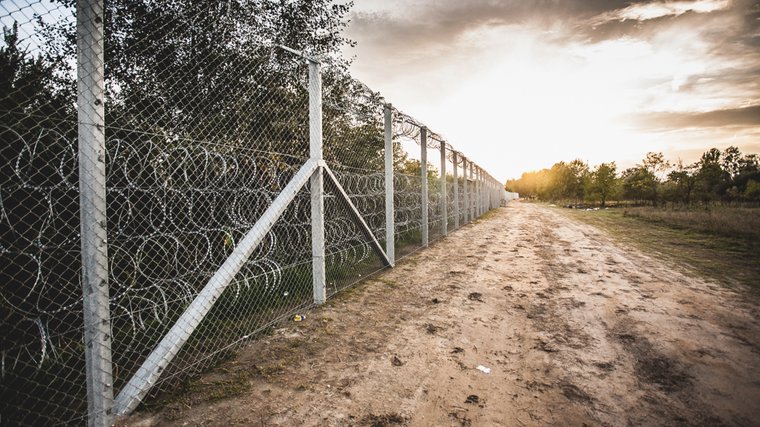Thirty years on from the fall of the Berlin Wall, Europe has built hundreds of miles of new fences – with plans for more.
Mark Akkerman is a researcher at Stop Wapenhandel, the Dutch Campaign Against Arms Trade, and for the Transnational Institute and author of the report ‘Expanding the Fortress: The policies, profiteers and people shaped by EU’s border externalisation programme’.
Cross-posted from Open Democracy

hirty years ago the fall of the Berlin Wall raised hopes of a peaceful open Europe, free from the ideological division and threat of (nuclear) war that had plagued it for decades. However, in 2019 we see a Europe with more walls than ever before – this time to seal Europe off from people from the rest of the world, trying to stop desperate people from finding safety and the hope of a livable future.
Moreover, the prospects look bleak: in its next budget cycle (2021-2027) the EU will pump billions of euros more into border security. There is only one clear winner: the European military and security industry booming from this wall-building business. EU migration policies have been following this trajectory for at least thirty years, but the ‘refugee crisis’ in 2015 led to a rapid escalation of border militarisation and increasing spending.
The construction of 1000 kilometres of border walls – the equivalent of six Berlin Walls – and an increase of Frontex maritime operations, covering at least 4750 kilometres in the Mediterranean and between the African mainland and the Canary Islands, have been highly visible elements of this trend.
These have been accompanied by an enormous increase in spending on border security, which continues to grow exponentially. EU member states have spent at least €900 million on land walls, while Frontex has put at least €676.4 million into its maritime operations from 2006 to 2017, according to a new report, ‘The Business of Building Walls‘ by the Transnational Institute (TNI), Stop Wapenhandel and Centre Delàs.
The military industry is the only winner
For its next multiyear budget (Multiannual Financial Framework 2021-2027) the European Commission has earmarked €8.02 billion to its Integrated Border Management Fund and €11.27 billion to Frontex, of which €2.2 billion will be used for acquiring, maintaining and operating air, sea and land assets. The exact planned budgets for (biometric) identity databases and surveillance system Eurosur aren’t clear yet, but spending on these ‘virtual walls’ will amount to at least €1.9 billion for the period 2000-2027.
These budget increases are the result of a political consensus built up systematically and promoted by the same corporations that profit. They have succeeded in framing migration as a security problem, to be dealt with by military and security means, rather than a social phenonomenon with political and economic roots. Through their participation in EU research programmes, high-level advisory groups, arms and security fairs, meetings with high-ranking EU officials and consistent lobbying, European military and security companies have positioned themselves as experts and presented their goods and services as the solution.
As a consequence large European arms companies, such as Airbus, Leonardo and Thales, have reaped the benefits of these policies they have lobbied for. Perversely, they are even making profits from selling arms to the regions from which people are forced to flee in the first place. Exports of arms to the Middle East and (North) Africa have contributed to wars, repression and human rights violations that are the key drivers of forced migration.
When it comes to the border walls, the arms companies are supported by an array of companies, from construction firms building the walls and fences on land borders to shipbuilders providing the vessels for Frontex operations to IT and technology companies involved in the biometric databases and surveillance systems. Spanish company European Security Fencing, for example, has provided razor wire for many border fences. Many European border and coast guards have deployed patrol vessels from Dutch shipbuilder Damen, which has also sold vessels to the Turkish and Libyan coast guards. And French IT company Sopria Steria has earned over €150 million from EU contracts for the development of fingerprint database EURODAC and the information-sharing systems Schengen Information System (SIS II) and Visa Information System (VIS).
Meanwhile, since 2015 over 17000 refugees have died in the Mediterranean Sea, and those are only the ones whose deaths have been registered. As the UNHCR reported on 3 November it estimates twice as many refugees die crossing Africa towards Europe, largely out of sight of European press and public. These deaths are directly related to European migration policies, which have pushed refugees towards more dangerous routes and into the arms of criminal smuggling networks.
The new border walls are a stain on the European conscience and an indictment on the EU’s failure to live up to the hopes of its peoples for a new more open society in 1989. Today’s walls need to be replaced by policies based on providing shelter, assistance and a safe future for refugees as well as working on eliminating the reasons people are forced to leave their homes in the first place.


Be the first to comment